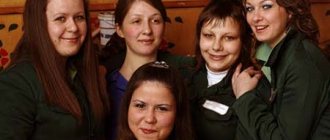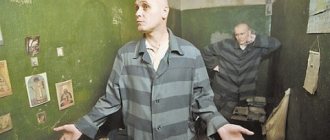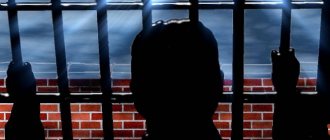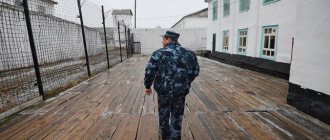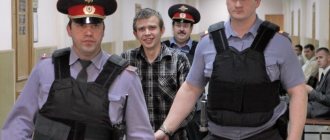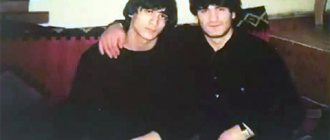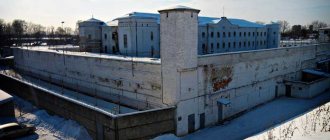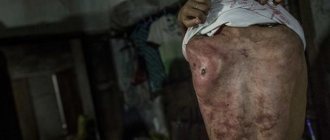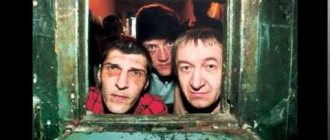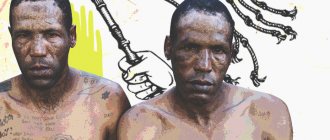Alexander Zakharov, or “Star of Balashikha”
Alexander Zakharov became famous in the thieves' community after he spent 90 days in the punishment cell of the Vladimir Central prison, although the usual period for placing a criminal in a cell is 15 days.
Zakharov committed his first offense at the age of 15. He was prosecuted for robbery and sent to a correctional colony. Alexander's next crime was murder, for which he was sentenced to 9 years. Once in prison, he managed to prove himself among the prisoners and ended up in. After serving his sentence, Zakharov was again sent to prison for possession of narcotic substances.
Alexander Zakharov underwent the “coronation” procedure at the Vladimir Central. It was rumored that he lived quite comfortably in prison: he was allowed to watch TV, drink alcohol, and even leave the prison grounds. While he was serving his sentence, his accomplices continued his business in Moscow and the Moscow region, keeping the trading sector under control.
Zakharov created a criminal group whose main task was to “liberate” Moscow from Caucasian individuals (from the criminal world). His main idea was an exclusively Russian state, without representatives of other nationalities.
He currently lives in Balashikha, having finally completed his criminal activities. As far as we know, Zakharov is suffering from health problems. And some people think it’s not easy for him to get used to the modern world.
Max Pioneer
Novikov Maxim Igorevich grew up in the city of Penza; he was also born here on June 28, 1979. He was crowned a “thieves in law” in 2014, but was first sent to prison only in 2015 for possession of narcotic drugs. The court sentenced the thief, nicknamed “Maxi Pioneer,” to imprisonment for a term of 3 years and 6 months, but the young man did not live to see his release.
Maxim Novikov passed away under strange circumstances. On February 10, 2016, in a punishment cell, he hanged himself in his cell. The official cause of death is suicide.
Sergey Klementyev (Klim)
Initially, Sergei Klementyev’s life was going well: he was born into a good family and was a professional athlete. But at some point after the army, the young man stumbled and was caught stealing, for which he was sent to prison for 1 year. Among other criminals, Sergei quickly got used to it and fell into the company of prison authorities. For the next crime, Klementyev was sentenced to 10 years of strict regime.
In the “dashing 90s” Klim had his own gang, “protecting” local businessmen. Sergei was respected in the criminal community and in 1998 Klim was “crowned”, so the whole of Novosibirsk and the surrounding territories came under his protection. But he did not enjoy the joy of “ruling” for long, since due to his foolish thirst for money and power, he accumulated many enemies who deprived him of his “crown.”
Klim died in 2015 due to kidney failure.
Alexander Khabarov
Many years have already passed since Alexander Khabarov passed away, but residents of Yekaterinburg still remember him, saying that under him order reigned in the city. He was born in 1957. He lived the same way as all his peers; attended school and played sports, even planning to become a physical education teacher. He has been associated with crime since 1992, when he created an organized criminal group of the same name at Uralmash.
For a long time, Khabarov was involved in racketeering and extortion, remaining unpunished. But, in 2005, after being intimidated by bandits, he was sent to prison. But he didn't stay there long. On January 27, 2005, his dead body was found hanging from a noose in one of his cells. It is still not known exactly how the head of the mafia hierarchy in Yekaterinburg passed away. For a long time, the investigation considered both suicide and violent death, but they were unable to find any supporting evidence.
Pavel Zakharov, or Pasha Tsirul
Pavel Zakharov is a Russian thief in law nicknamed Pasha Tsirul. He was one of the main drug lords of Russia in the 1990s and held the thieves' common fund for many years.
Pavel began to engage in thievery as a teenager, and was first caught pickpocketing at the age of 19.
In prison he was crowned and joined the ranks of the youngest thieves in law. Zakharov received his next sentence for theft. After serving his sentence, he organized his own group that dealt in weapons, drugs and, of course, fraud.
He became a drug lord at the very peak of drug trafficking in Russia. Hiding behind his power and authority, Tsirul began to neglect the code of thieves, violating its laws and prohibitions. In 1995, he organized the sale of narcotic substances, for which he was arrested. And in 1997 he died in Lefortovo prison in Moscow.
Oniani Tariel, or Tarot
Oniani Tariel plunged into the criminal world as a teenager. At the age of 17, he began to trade in theft and robbery, at the same age he was caught and was convicted for the first time. Throughout his life, Taro served time in prison 8 times. He received the crown in the 80s, at which time he was perceived on a par with the most authoritative thieves in law.
In the 90s he decided to leave for France. Then he moved to Spain, where he started the construction business. Among the locals he is accused of laundering thieves' money.
The quiet life did not last long, as Oniani decided to start a war with other leaders of criminal groups and made Yaponchik and Ded Hassan his enemies. But he could not cope with them, and was sentenced to 10 years for kidnapping a businessman.
A prison paradise for authority figures
A prison paradise for authority figures
Cells with upholstered furniture, voyages abroad and others, and simply rich prisoners
A loud scandal is breaking out in the FSIN system: prosecutors discovered luxury apartments for crime bosses in the Volgograd penal colony IK-12. The rooms had upholstered furniture, an aquarium with fish, air conditioning, plasma TVs, stereo systems, as well as photo galleries of thieves in law.
On October 7, a group of auditors from the regional prosecutor’s office came to IK-12 for a scheduled inspection. During their inspection, the inspectors accidentally came across a “relaxation room” with an aquarium and a TV. The interior was complemented by icons on the walls and a massive wooden cross decorated with amber. In the closet there was a bar with expensive imported vodka, cognac and whiskey. A collection of men's perfumes and civilian clothing were also found there.
“The prison staff refused to open another room, which bore the mysterious name “Section No. 2,” for a long time, citing either its secrecy or the lack of keys, says Oksana Cheredinina, official representative of the Volgograd Region Prosecutor.
When the door was finally opened, prosecutors saw a table set with a hot breakfast, a refrigerator with food and another bar with expensive alcohol. The prosecutors were amazed that on the wall hung a photograph of thief in law Vasily Babushkin ( Vasi Brilliant ), a legend of the criminal world who died about 20 years ago. And next door are home photos of local crime bosses.
The third room was a bedroom. There was a wooden bed, a TV and an air conditioner.
At the colony headquarters they discovered a real warehouse where homemade knives and sharpening devices, cell phones and chargers were stored. Here is a kind of photo gallery of prisoners' fame: former and current authoritative prisoners, as well as famous thieves in law. A special place was given to the portrait of the legend of domestic crime Vyacheslav Ivankov, better known as Yaponchik .
The colony staff could not explain to the prosecutors where such comfort came from.
— A submission has been submitted to the regional department of the Federal Penitentiary Service. The materials were sent to the investigative authorities to initiate criminal cases on the facts of possession of bladed weapons and clearly illegal actions of officials,” Oksana Cheredinina explained.
This is not the first time that Volgograd prosecutors find “little amenities” for authoritative prisoners in colonies.
“In June, in Medical Correctional Institution No. 23 in Uryupinsk (for the detention and outpatient treatment of convicts with open tuberculosis), cell phones and laptops were discovered, with the help of which prisoners communicated on social networks and posted photo reports there,” says a representative of the prosecutor’s office.
A representative of the Federal Penitentiary Service of the Volgograd Region, Alexander Kolobanov, explained that an internal check is being carried out in colony IK-12.
“Such violations are not a system, but it is difficult for us to keep track of all 18 institutions, which house about 16 thousand prisoners,” the official said.
Prisoners also live comfortably in other colonies of the country. A few days ago, the Investigative Committee opened a criminal case into violations in the Surazh colony-settlement of the Bryansk region, where businessman Andrei Pushkar was serving a sentence for fraud. As it turned out, he regularly went on business trips to Moscow, where he rented a hotel room.
Birthday of an authority figure in prison
In the summer of 2011, the pre-trial detention center of Serpukhov near Moscow was “checked in.” Photos have appeared on the Internet of how one of the crime bosses celebrated his birthday in a cell. The tables were laden with delicacies, caviar and alcohol, and the authority himself and his retinue dressed in sheets and crowns, depicting Roman patricians.
[“Moskovsky Komsomolets”, 07/20/2011, “I’m sitting on a bunk like a king on a name day”: This scandal can only be compared with what happened in Butyrka many years ago. Then, in the legendary Moscow pre-trial detention center, a young thief in law Sergei Sibiryak celebrated his birthday. Friends from the outside (including the leaders of the Solntsevo brigade) and even prostitutes came directly to the cell to congratulate the birthday boy. All the prison authorities lost their positions after the party.
This time the scale was a little smaller - there were no "moths." However, the personality of the birthday boy himself turned out to be much more modest. 26-year-old authority Anton Kuznetsov is a little-known figure in the criminal world. Traditional thieves in law do not know him at all and talk about the following: they say, he became a prison watcher only because there was no one better.]
The head of the colony was arrested for freedom in the zone
The Sovetsky District Court of Bryansk arrested the head of the Surazh colony-settlement, Lieutenant Colonel Igor Fitz. This institution became notorious in connection with the case of one of the prisoners - former assistant to State Duma deputy Andrei Pushkar, who, with the complicity of one of the leaders of the colony, was able to freely travel around the country.
Igor Fitz
A harbinger of a scandal appeared in mid-August, when the head of the internal security department of the Bryansk Federal Penitentiary Service, Alexander Ivanov, reported on the departmental website: “An internal check has been completed against one of the employees of the management staff of the colony-settlement. This institution is located in Surazh. Currently, about three hundred settlers are serving their sentences there. This person, in violation of the law, repeatedly provided travel, accompanied by employees of the institution, to one of the settlers to his place of residence before the court verdict.” And already at the end of August, the mentioned prisoner Pushkar gave an interview to one of the newspapers. The administration of the Federal Penitentiary Service could not say whether the reason for this impulse was the desire to get even with his offenders, but the revelations of the wealthy prisoner were a blow primarily to those who provided him with illegal services.
Former assistant to State Duma deputy Andrei Pushkar was arrested in July 2006. The court found him a fraudster and sent him to the Klintsovsk colony, where he allegedly immediately “bought” himself a large room. [[...]according to Pushkar, Fitz himself came to Klintsy to look after wealthy “clients” for his colony.
The conditions of imprisonment in the settlement are much milder than in a regular colony, a RG correspondent was told in the Bryansk department of the Federal Penitentiary Service. Although the inmates are dressed in a characteristic uniform and have their hair cut short, there are nevertheless no fences here, and all slaves can even work on civilian sites in the city. There is also its own pigsty, where convicts also work. With the permission of the administration, you can have money. But no one has the right to leave the place of detention without permission. But Pushkar traveled freely around the country, as proof of which he presented photographs and tickets. [[...]p>
The press service of the Bryansk Federal Penitentiary Service called the publication of Pushkar’s interview “a libel” where “the situation in the Bryansk colonies” was “tendentiously and mostly unfounded.” The reason why he decided to speak out was also given: “Probably, this was a kind of response from one of the defendants (a former convict in a colony-settlement) to the official investigations we initiated, including in relation to him, and an attempt to influence their course.”
The results of the internal investigations have not yet been reported, but the prosecutor's office of the Bryansk region immediately began checking the scandalous information. It turned out that “from December 2008 to July 2010, officials of the Federal Penitentiary Service repeatedly provided the opportunity for convicted Andrei Pushkar to travel outside the FBU KP-3, where he was serving his sentence, to Moscow.” There was no talk about a flight to Italy yet, but the materials from the inspections of the Federal Penitentiary Service and the prosecutor’s office were enough for the Unecha Interdistrict Department of the Investigative Directorate of the Investigative Committee of Russia to open a criminal case for abuse of official powers. The day before yesterday, the Prosecutor General's Office confirmed that, having received more than five million rubles from relatives and friends, an important prisoner, at the request of the colony administration, donated part of the funds for repairs in the colony, and spent the rest on creating “privileged conditions” for himself and even on trips outside the Bryansk region: “In In the period from December 16, 2009 to April 8, 2011, the convicted person, in violation of the requirements of the law, lived on a permanent basis in the long-term visiting room of the colony-settlement, for which he paid 6.5 thousand rubles monthly to the accounting department of the institution - more than 96 thousand rubles in total. To purchase building materials, he independently moved throughout the Bryansk region. The leadership of the colony and the territorial division of the penal system provided Pushkar with the opportunity, accompanied by colony employees, to travel to Moscow several times... While in the colony-settlement, Pushkar led an idle lifestyle and practically did not work and drank alcoholic beverages.”
The Bryansk department of the Federal Penitentiary Service refused to comment on the scandal in detail, citing the investigation of the criminal case. It is noteworthy that in April of this year, the court sentenced the former deputy head of the pre-trial detention center, Alexei Golfer, who forced the convict to purchase a kitchen set for him and pay for car repairs, for which he also exchanged prison conditions for something like a resort. Golfer’s colleague, the head of the Surazh colony-settlement, Igor Fitz, objected to his arrest at the court hearing, but the judge could not help but take into account the fact that the case had already received too much publicity.
In prison
A wealthy prisoner told MK about Russian prisons: for money you can do anything there - drink, bring women, go to restaurants and even fly abroad for the weekend
“You surprisingly accurately called the colonies “zones of unfree enterprise,” the interlocutor begins, recalling my scandalous article about the Bryansk FSIN (“MK” for March 18). “But they are also “zones of fantastic opportunity.” I will prove to you that today you can afford everything behind bars. If only there was money. A prisoner can walk around the city accompanied by guards. May sit in restaurants and bars in the evenings. If desired, he can even go abroad for a weekend...
This man's story shocked me. The story of a wealthy man who ended up behind bars, where he, as he himself puts it, became a participant in a grandiose show. The “ticket” there, however, cost more than one million rubles. But the heads of the two colonies almost fought over the prisoner who laid the golden eggs.
Funny to the point of tears. Horrible to the point of disgrace. What we were able to verify was confirmed.
“Behind bars I ended up at a banquet”
To our meeting, Andrei brought hundreds (!) of photographs, receipts, and invoices, which should confirm his words. Well, and your certificate of release. Dated May 2011.
— How did you end up behind bars? What were you serving time for?
— On charges of fraud (under Article 159 part 4). I was arrested in July 2006. At that time I was an assistant to a State Duma deputy. In short: it so happened that I ordered equipment for a construction oligarch, and the intermediary disappeared along with the money. I had to answer. The judge gave 9 years. I was in a pre-trial detention center for a year, and then went to prison.
— Did you immediately get to the Bryansk region?
- Yes. First they sent me to a colony in the city of Klintsy. When I arrived there with other prisoners, the employee who was responsible for receiving prisoners could not count us. He kept falling - he was so drunk! We paid some “supervisors”, and they gave us a huge (50 sq. meters) room in the barracks.
- What, did you have money with you?
- Of course. They were always with me, just like cell phones. I even rode along the stage in a “Stolypin carriage” with one pipe in my pocket, and the second one was on my hand (you know, there are such watches with a telephone). You give each guard 500 rubles - and there are no problems. In the evening, in a new place, I went out into the yard and did not immediately understand where I had ended up. It looked like some kind of main street in the south. People walk, drink, shoot drugs, walk. Noise, songs, screams. As they say, all the people are having fun and rejoicing. The employees calmly look at this and only ask that they not come close to the forbidden territory. If someone falls down, they say: take him away quickly and put him to sleep.
In prison
— How long did you stay in Klintsy?
— From July 2007 to December 2008. All this time there was a non-stop banquet. It seemed like it was a camp for the insane, because there was no order there. I was considered responsible for the barracks, and drunken convicts came to me all the time and began to prove something. There was only one way to stop them - by beating them well. Look, I broke my brush because of this.
-Where did you get the booze?
— Near the colony there is a collective farm “Pervoe Maya” (May Day). Its inhabitants, in my opinion, did not work at all at that time. They lived by feeding the convicts. They threw food, cell phones, cigarettes, alcohol over the fence... Now, as far as I know, in the Klintsov colony, like in many others, they have even created “anti-throwing brigades” of employees. But then they weren’t there. And it was mostly children who abandoned them - what will you do with them, how will you punish them?
There was a case when the former head of the colony, Alexander Terezov, was almost hit by a flying bottle of moonshine (his cap was knocked off his head). Up to 300 liters of this swill per day were thrown into the colony. Everyone drank, and sometimes to such a state that they did not come to their senses for several days.
Andrey rides his bicycle around the territory of the colony.
— How was the money transferred?
— Through employees or all through the same fence. We had everything we wanted. I even ate sushi every day. But this was thanks to a cook from a Moscow restaurant (I don’t remember under what article he was convicted). [[...]oh, this is all, as they say, a saying. The most interesting thing happened later, when I was transferred to a colony settlement in the city of Surazh (also in the Bryansk region). To do this, we had to give some money to repair the Klintsovskaya colony. Common practice, by the way. For money you can be transferred from one colony to another, which you like better or where your friend is sitting.
“I went to Moscow for the weekend”
— Did the Surazh colony impress you even more?
- Not that word. But there everything was completely different. Looking ahead, I will say that those who do not have money walked in formation, and those who have money lived like in a pioneer camp. By the way, I met in advance the head of the colony, Lieutenant Colonel (at that time he was still with the rank of major) Igor Fitz. A most interesting character. He came to Klintsy to select prisoners for himself. In general, as a “perezimnik” (a convict whose regime for serving his sentence is changing) I should have been sent from Klintsy to another region. But thanks to the head of the Federal Penitentiary Service for the Bryansk Region, they left me. It was generally his idea - to leave convicted Muscovites who have money in order, so to speak, to raise the colonies of the region at their expense.
The key to the same hotel room and the identity card of the convicted person. Photo: Eva Merkacheva.
When I arrived at the colony with my things, the operatives greeted me as a dear guest. The table was set. I remember there was even Bryansk Partisan vodka there. This is how we met. I immediately stopped at the hotel. I rented a room in which I lived for 2.5 years. During this time, I never even spent the night in the zone itself, where all convicts serve their sentences. I had room No. 6 (my friend lived next door - in No. 5). I even took the key to it with me - let it be kept in your editorial office.
— Is the hotel located on the territory of the colony?
- Not really. It stands as if on the territory of a utility yard, which is actually open. There are places where there are holes in the fence and you can always just leave by passing the headquarters checkpoint. This hotel is intended for long dates. I made a bar in my room, hung a home theater and brought whoever I wanted there. I remember that after your article, the inspectors came into my room, and I was holding a mobile phone in one hand, and a glass of cognac in the other. And everyone pretended not to notice anything. The room officially cost only 5-6 thousand rubles a month. But these are pennies compared to what they unofficially charge you for being there.
— As far as I know, in a colony-settlement, in principle, the regime is softer than elsewhere, and convicts can be released outside.
- Living outside the colony is still prohibited. And you can spend some time in a hotel if your relatives come to visit you on a date, but you certainly cannot live there. Officially, convicts are entitled to 10 days of vacation per year for good behavior. In reality, they were released very rarely and for a very short time. And I had an agreement with my boss that I would leave whenever I wanted, but return at night. There were cases when I returned in such a state that they carried me to the entrance. Fitz simply took money for this. A fine—that’s what he called it. But the funniest thing is that I went to Moscow for the weekend.
- How did this happen?
Operatives Bolmat and Boyko in a cafe during the next escort of Andrei
— The head of the colony provided two operatives who accompanied me. We were traveling by car. In Moscow, I checked these operatives into the hotel of the Central House of Tourists (they always lived there during our visits to the capital - and any request to the hotel will confirm this), and I left on my own business. Two days later I picked them up, and we returned to Surazh. For a whole year, operatives Sergei Boyko and Alexander Bolmat traveled with me like this. One day we got so drunk that there was no one to drive. I had to call a taxi. Fitz kept worrying and calling to see if we were going.
Commentary from operatives
Alexander Bolmat:
— We really accompanied Andrei to Moscow. So I’m going to the department right now, they will ask me for an explanation about this. In Moscow we did not follow Andrei. And the whole trip was unofficial. Apart from Andrey, I did not accompany anyone. I don’t remember how many times we went to Moscow. Sergey Boyko:
— About Andrey, while the check is underway, no comments.
— And how often did you go to Belokamennaya for the weekend?
- 20 times. I bought every trip. The minimum bet was 20 thousand rubles. The last time I went was in December 2010 and paid 70 thousand in two days. In total, I paid 800 thousand for my trips to the capital. In Moscow I met with friends and spent time with my family. There are plenty of witnesses to this. Just think about it: a prisoner is sitting in a restaurant, without a single document, while he should be behind bars.
Sergey Moroz
There was a funny incident when we were sitting in a bar in Skolkovo. Strippers were dancing there; as it turned out, they had drugs with them - marijuana, ecstasy. And the upstairs neighbors (the bar was in the basement of a residential building) called the police. The law enforcement officers came and began asking all visitors for documents. I say: I have nothing, I’m basically a runaway prisoner. They laughed and left.
My friend and I also made announcements with my photo - like “the police are looking for them.” They hung it up for fun in several places. So no one even paid attention. I allowed myself to be fooled like that because the whole situation seemed absurd to me.
The head of the Federal Penitentiary Service for the Bryansk Region, Moroz, knew very well about my trips to the capital - I know that his operatives from the search department reported to him. But he didn't worry because he knew I would always come back. And, by the way, once I even flew abroad - to visit my friend Arthur in Italy.
“And Fitz let you go there?”
- I didn’t report to him. They escorted me to Moscow as usual, and from there I flew on my own. So he hardly knows that I was abroad.
— Did you have a foreign passport?
- Yes. A foreign passport is confiscated only during an arrest or if found during a search. In anticipation of your questions, I’ll say right away: I easily obtained a visa by calling my friends at the agency. The embassy has no information that I am a convicted person. Requests from there are not sent to the FSIN. Who needs it? So if a person is not on the wanted list, he can safely leave. And he will pass passport control at the airport.
Friend's comment
Arthur Eisman, German citizen:
— Andrey visited me in Rimini in the summer of 2009. He said that he was released from the colony on leave. What did you do? We rode mountain bikes.
Model colony for VIP prisoners
From news feeds (July 2010):
“According to the new concept of the FSIN, colony settlements will be divided into regimes - with a normal regime and with enhanced surveillance. An example of the latter is colony-settlement No. 3 in Surazh. Alexander Reimer (head of the Federal Penitentiary Service - E.M.) especially noted her, saying that she made the most pleasant impression on him - “she is a model for the whole country.”
— Andrey, but the colony in Surazh is considered exemplary.
- Well, I don’t argue with that. Firstly, it’s very tough there, not like in Klintsy. The convicts were forced to march, dressed in a terrible robe, and several rows of thorns were hung around the perimeter - like in a “strict prison”. This, for your information, is contrary to the law, because a colony-settlement should still have a softer regime, and even civilian clothing should be allowed there. Secondly, everything is equipped there, everything is clean and beautiful. But at whose expense? At the expense of the convicts. And those who gave not a thousand or two, but much more, enjoyed privileges.
How did it usually happen to me? The deputy bosses came and said: they say, we need to buy three computers. I bought it. Televisions, telephones... Half of all the equipment now in the colony was purchased at my expense. They carried it out as a purchase with extra-budgetary funds. If I left the colony during the day to walk around the city or play bowling (and I did this almost every day), I would ask Fitz: what should I bring? He said, for example: buy paints.
Witness comments
Director of the Bryansk construction company “Visit” Valentina Golosat:
— I remember Andrey very well. He bought building materials for colony No. 3. The last time I scored 60 thousand. But that’s just me. At the same time, he bought a lot for repairs in other stores. But not only him, other convicts too.
Former convict Z. (served time in the Surazh colony along with our hero): - At Andrey’s request, I was transferred from the colony in Starodub to Surazh. And there everything was put on a commercial basis. We all bought building materials. Personally, I'm about 15 thousand dollars. It was, let's say, voluntary-compulsory.
“I hired a team of construction workers who, with my money, built an officers’ mess and a quarantine room for new arrivals. I gave money (but among others) for two churches - one in the colony in Klintsy, the other in Surazh (there, however, only a stone was laid and a cross). It seemed to the jailers that they could milk me endlessly.
At their request, I bought some balls, tennis nets, a skateboard... I had a mountain bike, which I rode both around the territory of the colony and outside it. Fitz wanted to take it from me and rent it to prisoners for 50 rubles an hour. But then, thank God, I abandoned this idea. He was generally full of amazing ideas. (Grins.)
- Where did you get the money?
— All my comrades are businessmen. They sent it. Well, family. The parents still have receipts for 11 million.
— Did other convicts also give money?
“Everyone who had at least something in their hearts paid.” The principle of the Federal Penitentiary Service: all repairs are only at the expense of convicts. At the meeting, Fitz told the squad leaders: we need to buy this and that. Those: where will we get the money? Fitz: Don’t you have any prisoners, no one to shake? And the head of the detachment goes and bows to some prisoner - please, give me a thousand rubles for putty, I really need it. It's just a circus.
— Were there prisoners who refused to pay out of principle?
- There were, of course. But such people were set up. Behind bars, you can always accuse a prisoner of violating some points of the internal regulations. He smoked in the wrong place, sat down in the wrong place... etc. They did so, and then they said: “We will now tear up the report against you and solve all your problems. Just give me this much money for construction.” After that, almost everyone paid. Moreover, it could depend on what kind of characteristics you will be given for parole (parole).
— Did other convicts extort money from their brothers in misfortune?
- Only for administration needs. At one time, the head of the Bryansk Federal Penitentiary Service even came up with a scheme: to pull several “multi-movers” prisoners from the strict regime into the regular zone, who were made “activists.” Their task was precisely to put pressure on other convicts and extort money from them. And all such “activists” were part of the discipline and order sections. When the Ministry of Justice banned these structures, Bryansk jailers simply renamed them “detachment councils.” So, in Surazh, in one of the “detachment councils” there was a convict, Dima L. The head of the colony put him in charge of beating money. And L. broke someone’s spine or something else. He will now be tried for this under a new article and will be “re-treated.” But the horror is that he was fulfilling the administration’s request! I just overdid it...
— Were you set up too?
- No, why not? I already gave money. The colony staff called me on my mobile phone and said: “Andryukh, we’ll go to the store and put some caviar and cognac in your name.” Fine? Or there's a check going on. They call me: “Fitz said you should buy booze and snacks for the inspectors.” I went and typed. And I bought mobile phones in boxes so that I could give them away to my employees. Therefore, I could return to the colony at least every evening in a deranged state.
“But the rest of the convicts saw it.” Did Fitz really not react at all?
“Only once did he lock me in a punishment cell.” It was winter, ice, and I knocked him down drunk in front of everyone. But the very next day I was released. They were afraid that they wouldn’t get any more money from me (I told them so). And so Fitz usually scolded me: “Andrey, don’t go for a walk in the city, don’t get drunk in restaurants.” Kindergarten! I brought whatever I wanted with me to the hotel. You put 5-6 bottles of alcohol at the checkpoint for your shift and they will let you through without looking.
- Listen, but there are CCTV cameras there, everything is recorded...
— There are cameras there, but you won’t recognize anyone or anything on them. Just blurry shadows.
How one prisoner fed the heads of two colonies
— Maybe you brought girls to your room in the colony?
“I just didn’t need it.” But theoretically it is possible. By the way, there are convicted women in the colony. 50-60 people. Men and women are kept separately, with a fence between them. But they go back and forth through the checkpoint whenever they want (women even study at the school, which is on the men's side). They have sex anywhere - in the library, at school, in old trucks that are parked in the utility room.
— Did you stay in the Surazh colony until your liberation?
— No, I was “lucky” to also stay in Brasovskaya (also Bryansk region). This happened when the head of the Federal Penitentiary Service, Reimer, came to the region. It turns out that according to the new rules, it is impossible to keep together those who were sentenced to a penal colony settlement and those who were under regime regime (those for whom the court softened the regime). And it turned out that I and several other prisoners could not be in Surazh. We should have been transferred to Brasovo initially.
So, during Reimer’s check, we were transferred there. We arrived. And there is a high security zone. Near it is a small area, supposedly given over to a colony-settlement. In fact, there is a wooden hut on it in an open field, and there is nothing else! The colony is naked and poor. The heat is 38 degrees, there are two-tier bunks with not enough room for everyone. Toilet 100 meters outside. I looked at this mess for a day, two, and then I left and rented an apartment in the city.
- Like this?!
- And like this. I only came to the colony for morning and evening roll calls. Other convicts came for verification drunk (they ran to the nearest cafe). The guards didn't know what to do with them. They couldn’t even put any of us in a punishment cell, because it only exists on the territory of a “high security” colony. Once, the drunkest one was simply handcuffed to the bars.
I lived in the city in a rented apartment for two weeks. Then he had a big fight with Fitz and said that if he didn’t take me, then I would really stay here and say goodbye to him. That I will do some repairs here so that I can live.
From the MK dossier: Colombian drug lord Pablo Escobar agreed to sit only in the prison that he would build for himself. In 1991, he made a secret deal with Colombian President Cesar Gaviria. When Escobar built a prison at his own expense and according to his own design, he came there with things.
Gatherings on the river bank near the colony have become a tradition among VIP prisoners.
But then another problem arose - the head of the Brasov colony, Oleg Govorov, did not want to give me up. He created a scandal, shouted: take away all the convicts, just leave Andrey, I don’t need anyone else. They fought terribly because of me. Remember the story of how one man fed two generals? There was a joke about me - how one prisoner fed two heads of colonies.
They tried to separate me for two weeks. The head of the department, Moroz, said: let you decide among yourselves who will have him. As a result, Fitz took me, although according to the papers I continued to be listed in Brasov. Because of this, by the way, I left six months later on parole. When all the documents from Surazh arrived in Brasovo, Govorov refused to give me a description. And the court will not accept the case without it (although according to the law now the convicted person can apply for parole himself, in practice this does not work). And he didn’t give it for several months, until Fitz promised him that my friend and I would buy him 50 thousand worth of cement.
[[Vesti.Ru, 10/12/2011, “Special” regime cost the prisoner 5 million rubles”: In total, Andrei served four years and ten months. Got out on parole. The colony's leadership claims that they wanted to interfere, but this is not within their competence. The only thing is that I had to take the documents to the court and prosecutor’s office myself. By taxi. Each trip cost five thousand rubles]p>
- Just some kind of joke...
- Indeed, it got to the point of funny. Do you know how we got from one colony to another? The administration categorically refused to provide us with any kind of transport. They said: go as you want. I was shocked, I asked again: “What do you mean - as you want? We are condemned!” In response, they shrug their shoulders. As a result, we chipped in, rented a minibus for 10 thousand rubles and loaded ourselves into it with things.
The trip was powerful. The distance between Surazh and Brasov is about 300 km, the drive takes about 6 hours. We drove for almost a day. On the way we stopped at a cafe, swam on some beach... Then we returned from Brasov to Surazh in the same way.
— To be honest, all this seems incredible.
- So that’s where I started - we have a zone of unlimited possibilities! And I can tell you so many funny incidents that your newspaper won’t be enough. For example, I had an air conditioner in my room in Surazh. When I was transferred to Brasovo during Reimer’s visit, I decided to take the air conditioner with me (after all, the heat was intense last summer). The employees are almost in tears - leave it, Andryush, we’ll show it to Reimer... It turns out that rooms for long meetings should have air conditioning. I had to “rent it out.”
- Aren’t you afraid to tell all this? Maybe you are planning to leave the country?
“I’m not afraid of anything and I’m not going to leave Russia, at least for now. Those jailers will be jailed sooner or later anyway. Do you think your article will scare anyone? You are naive. They will conduct another check, and at best they will blame everything on Fitz. At worst, they will say again: the journalist’s arguments are far-fetched and have not found their objective confirmation, and that prisoner, offended, told her a lot.
- But you can be brought to trial for slander or for giving bribes.
“Everything I say, I can prove and bring a bunch of witnesses.” As for the bribe, basically everything was done as sponsorship, fines, etc. There was such a convict in the colony - B., who was milked almost the same way as me. He built greenhouses there and “engaged” in agriculture. And then the prosecutor came to the head of the colony, they talked about something in the office. After this, the guardian of the law demanded 120 thousand from B. (for the fact that he would not oppose parole at the trial). B. told me where to go. While receiving a bribe from his relatives, the prosecutor and his accomplices were detained by FSB officers. But he received a suspended sentence. And the last one, guess who is left? That's right, B.
He was not given parole despite all his excellent characteristics. Moreover, there were instructions to hunt him down in the colony. He was forced to voluntarily imprison himself for 90 days in a punishment cell (every prisoner has the opportunity to lock himself in order to protect his life). Then he was transferred to another colony, to Oryol.
I know many convicts who were promised parole by the heads of colonies for their “sponsorship.” The prisoners gave away their last, and they then laughed at them over a bottle, sitting with other jailers... There was no reason at all to help wealthy convicts free themselves, otherwise the flow of gold would dry up.
But if there is nowhere to go, then the jailers want to at least finally (as was the case with B.) hit a decent jackpot.
In general, in many ways they themselves are hostages of the situation. Little money is allocated from the budget, but they ask a lot from them. It is simply impossible to do without the financial help of prisoners. And everything rests on the convicted businessmen behind bars. But in order for them to voluntarily invest a lot of money (the lion's share of which, of course, ends up in someone's pockets), they are given preferences.
- Some kind of nightmare...
“You are so surprised by everything, but this is our system.” I have a friend who lives in Miami, but is listed in one of the Russian colonies. He came, gave a million dollars and never showed up again. This was several years ago. But this is his story, and I have no right to tell it.
Similar materials
- Maniac Yuri Tsyuman
- Prison everyday life. Part 12. Fenya
- Maniac Golovkin
- You can sit “like a human being”
- The true story of Aslan Gagiev
- Social network to help burglars
- Jap's life story
- Complete biography of Jap
Sergey Mikhailov, or Mikhas
Sergei Mikhailov is a Russian entrepreneur who is called one of the most influential authorities in the criminal world. At the age of 25, Mikhas first went to prison for fraud, but his punishment was limited to a suspended sentence.
After this, Mikhailov took up extortion. To do this, he organized his own gang, consisting of strong, big guys who were ready to make money in any way, and in the 80s he became the head of the Solntsevskaya organized crime group.
At the beginning of 2000, Sergei decided to leave the criminal business and returned to ordinary life. In 2003 he became a candidate of economic sciences, defending his dissertation. Currently he is the president of JSC Central House of Tourists.
Mikhailov became one of the few who was able to return to a quiet life. He put his biography in order and ensured that his name was not associated with criminal gangs.
Sergey Timofeev, Sylvester
The life of Sergei Timofeev began quite standardly: he was born in the Novgorod region, grew up as a calm child, studied well, worked part-time on a collective farm, and after studying he joined the army. Upon returning, he decided to move to Moscow and got a job there as a sports instructor.
But soon Sergei began to use his sports skills in another area and headed the Orekhovskaya organized crime group, which included his comrades - former athletes. The organized crime group got involved in racketeering, but Sergei was caught and was sent to prison for 3 years.
After serving his sentence, Timofeev returned to duty and organized a criminal structure that united all the groups in the Orekhovo-Zuevsky district. He was paid by various organizations: banks, catering establishments, restaurants and even stage stars. At the same time, Sergei was at enmity with Caucasian organized crime groups, which he actively opposed.
Sylvester died at the young age of 39 at the hands of his enemies. His car was blown up along with its owner.
Gennady Romanov, or Chamomile
Gennady Romanov was born in 1961 in Kemerovo, where he subsequently became part of the criminal world. He was first convicted at the age of 17 and sent to a correctional colony for hooliganism. His next convictions were for robbery, possession and trafficking of weapons and drugs.
In 1994, Gennady went to prison, where the authoritative thief in law Tristan Sichinava was imprisoned. They got to know each other, and Gennady managed to impress Sichinava, who decided that Romashka needed a crown.
In 2004, Romanov created an organized crime group that traded in robbery and extortion. He and his group carried on their activities for 4 years, and in 2008 he was convicted of creating an organized crime group. Romanov did not live long, his drug addiction greatly ruined the years of his life, and he died in 2011.
Railway carriage
Vagin Vladimir Viktorovich was born on February 3, 1966. Already at the age of 16, he first ended up in a correctional colony. The court sentenced the young guy to 3 years in prison. Since then, Vladimir Vagin, aka “Vagon,” has been in prison all the time, occasionally being released. In the criminal world, the criminal was able to achieve good success: in 1995 he was crowned a “thieves in law”, and later he became the “supervisor” of Nizhny Novgorod.
The last time “Vagon” was arrested for intentionally causing bodily harm was in 2014. The court sentenced him to imprisonment for 7.5 years. In the Nyroba colony on September 21, 2022, he was found hanging from a noose in one of the cells. What happened led to a terrible shock to his loved ones, who unanimously asserted that the thief in law could not commit suicide. The same version is supported by lawyers who visited the prisoner several days ago. They insisted that he did not look depressed.
Gennady Karkov, or Mongol
Gennady Karkov is an authoritative thief in law of Soviet times. He came to Moscow after the war and started stealing here, which is how he got caught. In prison, he managed to join the local authorities, who called him a “trump card”.
After leaving prison, Gennady headed to Moscow, where he organized his own criminal group, whose activities were based on robberies and racketeering. The organized crime group existed for only a year, but managed to carry out several dozen attacks.
The gang was caught in full force and all 27 people were arrested. The Mongol was given 15 years. While serving his sentence, Gennady received his crown and the title of “thief in law,” but did not live in this status for long. He was released on parole, after which he faded away over several years, battling cirrhosis of the liver. Died in 1994.
Aslan Usoyan, or Grandfather Hasan
The well-known Aslan Usoyan was the largest Soviet and Russian authority. He received his first conviction at the age of 19, resisting police officers (1.5 years).
Having freed himself, Aslan took up fraud and speculation. By the age of 40, he controlled several Caucasian organized crime groups and gangs. Grandfather Hasan became famous for his cruelty; he had a team of professional killers under his command. In 2013, he was killed by a killer.
Vyacheslav Ivankov, or Jap
Vyacheslav Ivankov trained as a circus performer and dreamed of working in education. But the injury he received forced the man to leave this field.
Vyacheslav committed his first crime at the age of 25, but did not go to prison. After a medical examination, he was found to have schizophrenia, so he was sent for compulsory treatment.
After leaving the hospital, he worked for Karkov, but was the only one who was able to escape punishment. After some time, he created his own organized crime group. Their activities were aimed at burglaries and everyone associated with the shadow economy.
In the 90s, he moved to live in America, and 3 years later he went to prison for extortion. Yaponchik returned to Russia 10 years later, but died here after an assassination attempt was organized on him.
Rezo Malania
Another Georgian thief in law, Rezo Malania, aka Gaga Sukhumsky, also did not live to see freedom. He was born in 1972 and has been associated with criminal activity since adolescence. At the age of 24 he was crowned, but until that time he had never been to prison.
In 2007, a criminal was detained for an armed attack on a currency exchange office. During the investigation, it was revealed that he was the organizer of the attack. A trial took place in the city of Moscow and Rezo Malania was sentenced to 18 years in a maximum security colony. He was sent to serve his sentence in the city of Kopeisk, not far from Chelyabinsk. The thief in law died here on May 4, 2009. The reason for his death was hepatitis.
